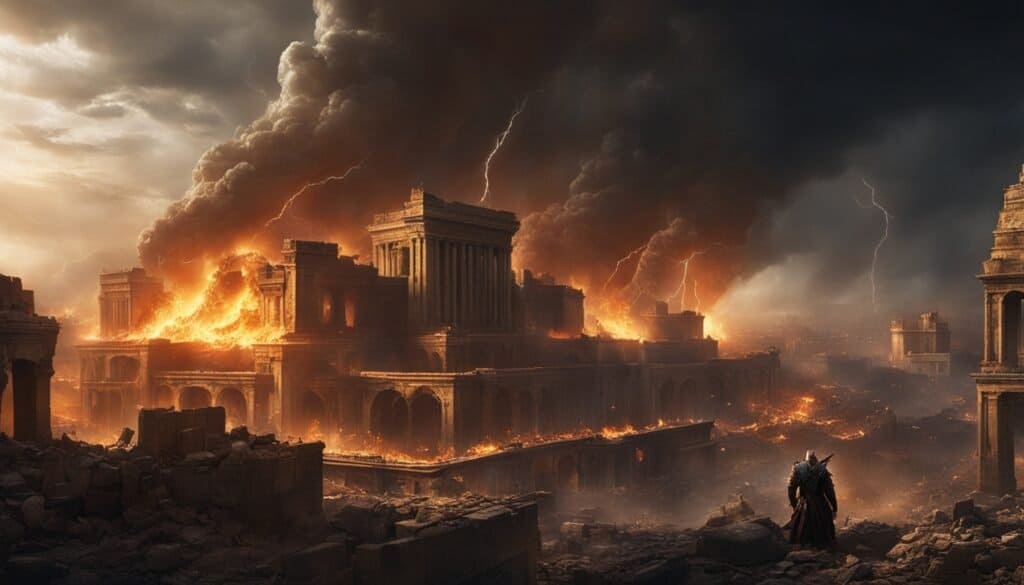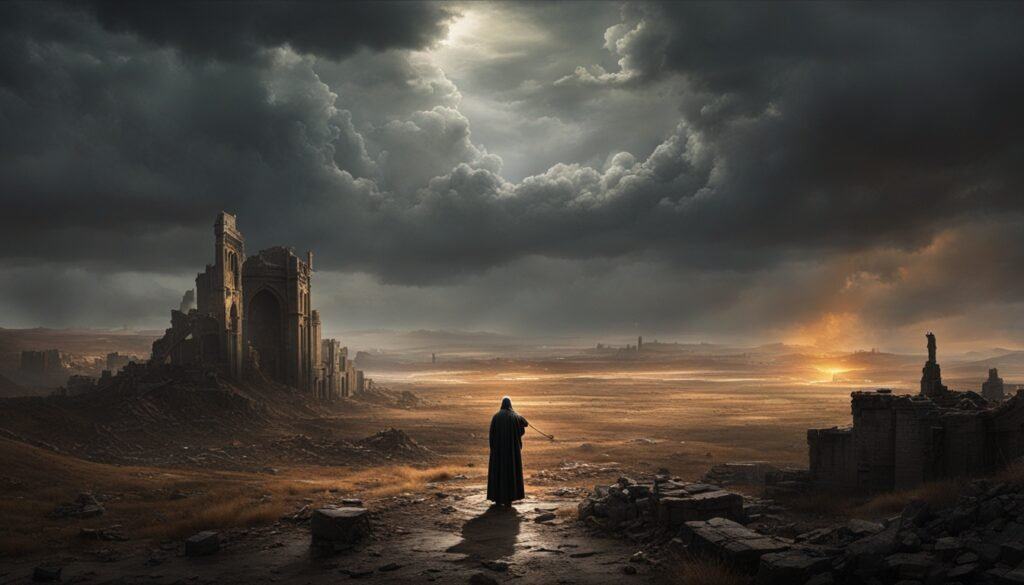Ever wondered what comes after Jonah’s story in the Bible? The story doesn’t just end with Jonah’s mission and the lesson of mercy. What follows is just as powerful, leading us into the teachings of the minor prophets. We’ll see how themes of justice and prophecy continue, starting with Micah. Let’s explore God’s next chapter, highlighting calls for righteousness and warnings for His people.
Key Takeaways
- The Book of Jonah emphasizes key themes of mercy and forgiveness.
- Micah follows as the next voice among the minor prophets, focusing on justice.
- The prophetic messages in the subsequent books provide essential insights into God’s character.
- Understanding these texts is crucial for appreciating the broader biblical narrative.
- The minor prophets together create a rich tapestry of divine guidance for humanity.
Introduction to Micah: The Prophet of Justice
In the Bible, Micah stands out as a key figure, known for his call to justice. He spoke out during the reigns of Kings Jotham, Ahaz, and Hezekiah. Micah 1:1 shows us his prophetic role, highlighting God’s disapproval of the corruption and idolatry back then.
Today, Micah’s words still speak to us, urging us to focus on justice. His messages are especially powerful when talking about the Messiah’s coming. This idea of a savior brings hope and motivates us to work for justice.
Micah teaches us about living justly, with compassion, fairness, and righteousness at the core. His teachings guide us on how to act justly in our daily lives.
Micah’s views give us a fresh way to look at our values. He urges us to fight for social justice and to believe in the Messiah’s promise. This makes us think about our actions and how they affect society.
Micah’s Call to Justice
Micah’s Call to Justice is a key message in the Bible. Micah 6:8 tells us what God wants: “to do justly, and to love mercy, and to walk humbly with thy God.” This verse teaches us about living justly, showing mercy, and being humble. It shows us how to live our lives every day.
Understanding Micah 6:8
Micah 6:8 reminds us of the importance of justice. Justice is more than just being fair. It means working for what’s right for everyone, making the world a better place. By following this scripture, we check our actions and how we treat others. This helps us follow God’s will more closely.
The Importance of Mercy and Humility
Adding mercy and humility to our fight for justice makes our spiritual journey richer. Seeing that everyone faces challenges helps us be kind. Humility reminds us to keep a balanced view. We should work for justice with a kind heart. Combining justice with mercy and humility makes our actions beautiful. It shows what Micah’s Call to Justice is all about.
The Prophecies of Nahum: The Fall of Nineveh
Nahum’s prophetic message shows us the fate of Nineveh, a city known for its cruelty. In Nahum 1:1, we see “the burden of Nineveh.” This phrase introduces the vivid images and strong messages that follow. It tells us the seriousness of the prophecy, which is about divine judgment.
Context of Nahum 1:1
To understand Nahum’s words, we must look at the history and culture of Nineveh. This city was once a powerful place in the ancient Near East, known for its violence and cruelty. Nahum’s prophecies were a response to this long history of oppression. They help us see how deep God’s anger was with such actions.
The Significance of Nineveh’s Destruction
The destruction of Nineveh is a key event in the Bible that shows God’s justice. It was the end of a warning to an empire that did not act right. The fall of Nineveh teaches us about the dangers of ignoring what is right. It warns us about the consequences for unjust actions.
This event is not just a reminder but also a warning to unjust nations. For more on this, check out this resource and think about how it relates to prophecy.

What Comes After the Book of Jonah
After the Book of Jonah, we move to Micah, a key figure in the prophetic order. The minor prophets like Nahum and Habakkuk add their views on God’s justice and mercy. This flow of texts deepens our grasp of biblical themes and how God relates to humans in different situations.
Micah talks about justice and our moral duties, which are still big issues today. These messages help us see God’s plan and his expectations for us. They make us think about our place in this story.
The stories from the minor prophets show us God’s nature and what he wants from us. They make us think about faith and our duties. They push us to see our role in this story.
| Minor Prophet | Main Themes | Significant Prophecies |
|---|---|---|
| Micah | Justice, Mercy | Micah 6:8 |
| Nahum | Judgment Against Nineveh | Nahum 1:1 |
| Habakkuk | Questioning God’s Timing | Habakkuk 1:2 |
From Jonah to Micah, we see a deepening of themes, not just a simple timeline. This journey helps us connect more with the scriptures and think about today’s problems. It encourages us to explore the depth of our faith and its impact on our lives.
Looking into these ancient texts, Jonah’s teachings can help us understand the messages that follow. By applying these teachings, we can see how the scriptures are still relevant to us.
Let’s dive into the insights of these minor prophets. Their messages can shape our views on justice, mercy, and faithfulness. We invite you to explore these themes further as they appear in the scriptures. For more insights, check out this resource on questions raised in the scripture.
God’s Vengeance and Nineveh’s Fall
In the book of Nahum, we learn about God’s vengeance and its deep meaning. Nahum 1:9 says, “What do ye imagine against the Lord? He will make an utter end.” This shows us that opposing God comes with severe consequences. Nineveh’s story warns us of the dangers of acting unjustly.

God’s vengeance is not random; it shows His dedication to fairness. Nineveh’s destruction teaches us about the risks of living in a wicked society. It tells us to always stand against injustice in our lives and around us.
Learning from Nineveh’s fall gives us important lessons. It teaches us to seek justice and admit our own wrongs. Knowing about God’s vengeance pushes us to live honestly and be accountable. For more on the flaws of biblical figures, check out the character flaws of the patriarchs.
The message of Nahum is clear: God’s vengeance means no harm will come to His people without a response. This warning and call to justice encourages us to build a fair and respectful community. By doing so, we reflect God’s nature in our actions.
Habakkuk’s Dialogue with God
In our look at Habakkuk’s talk with God, we see a deep dive into the mystery of divine justice. This conversation shows the need to seek answers, especially in Habakkuk 1:2. There, the prophet wonders why God seems silent when people suffer.
Analyzing Habakkuk 1:2
Habakkuk 1:2 shows us a common struggle with justice. The verse says, “O Lord, how long shall I cry, and thou wilt not hear?” This shows a deep desire for God to act against injustice. It makes us think about our own feelings when we see unfairness.
The Theme of Divine Timing
The idea of divine timing comes up as we explore Habakkuk’s thoughts. He’s not just asking for quick help but wants to understand God’s big plan. This makes us think about our faith and the mystery of God’s timing. It teaches us to trust that God will act when the time is right, even if it feels like nothing is happening.

Thinking about Habakkuk’s conversation with God teaches us to be patient and strong when we’re unsure. His story helps us deal with our own doubts about justice and faith.
The Vision of Zephaniah: The Day of the Lord
In the Book of Zephaniah, we find a deep vision about the “Day of the Lord.” This time is very important, filled with both judgment and hope for fixing things. Zephaniah 1:7 tells us to be humble and respectful when facing God.
Zephaniah 1:7 and Its Implications
Zephaniah 1:7 tells us to “hold thy peace at the presence of the Lord.” This shows how serious God’s judgment will be. Thinking about the Day of the Lord makes us realize we must be careful with our actions. It calls us to look inside ourselves and change for the better.
The Promise of Restoration
Even though Zephaniah talks a lot about judgment, there’s a big promise of fixing things. The prophet says God will always stand by His people, even when things look darkest. This mix of judgment and fixing things helps us understand the Day of the Lord better. It makes us want to follow God’s will in our lives.

Zephaniah’s messages are important and affect how we see faith. The mix of judgment and fixing things shows us more about God’s nature. For more lessons from the Bible, check out this link.
| Key Concepts | Implications |
|---|---|
| Day of the Lord | Time of reckoning and accountability |
| Judgment | Call for humility and introspection |
| Restoration | God’s enduring mercy and commitment to His people |
Haggai’s Call to Rebuild the Temple
In the Old Testament, Haggai played a key role during a crucial time for the Israelites. They had returned to Jerusalem and were working to revitalize their community. Haggai’s call was a call to action, urging them to rebuild the temple. This act was not just about building a structure. It was about spiritual renewal and finding their identity as a community.
In Haggai 1:1, the prophet spoke directly to Zerubbabel and Joshua, the leaders of the returned exiles. He stressed the need to rebuild the temple. This was not just a physical task but a sign of their faith and covenant with God. His words highlight the importance of community and worship.
Haggai’s call was more than about rebuilding with bricks and mortar. It was about reviving their worship practices. This showed how their faith and identity were deeply connected. Reflecting on Haggai’s words, we see how a renewed commitment to worship can shape a brighter future for Israel.
| Key Elements of Haggai’s Call | Significance |
|---|---|
| Address to Leaders | Guidance for community direction |
| Rebuilding the Temple | Physical and spiritual restoration |
| Covenantal Worship | Reestablishing community identity |
| Haggai 1:1 | Direct communication from God |
Zechariah’s Visions of Restoration
Zechariah’s visions bring us a message of hope and renewal. They were meant for the Israelites when they were rebuilding. These visions remind us of God’s promise to His people.
Understanding Zechariah 1:16
In Zechariah 1:16, God promises to return to Jerusalem with mercy. This shows how God plans to restore His house and the city. It gives the Israelites a sense of purpose and unity.
The Future Blessings for Jerusalem
Zechariah’s visions are not just about restoration. They talk about future blessings for Jerusalem. This city is meant for greatness. These prophecies show how God’s grace will revive Jerusalem’s physical and spiritual state.
Embracing these blessings inspires us in our own paths. We learn that God’s promises bring us hope and faith.
Malachi’s Prophetic Message
The Book of Malachi marks the end of the Old Testament’s prophetic writings. It stresses the importance of Malachi’s message. This message is about faithfulness and worship. Malachi urges us to look closely at our relationship with God.
In Chapter 1, Malachi expresses deep concern about the community’s spiritual health. He urges us to wake up from our complacency. He reminds us to focus on true worship.
Malachi urges us to return to sincere worship. He wants us to be genuine in our faith and actions. He points out the people’s neglect and stresses the importance of real worship.
Reflecting on Malachi’s message shows us its deep meaning. He calls for a life fully dedicated to God. This means having a strong relationship with God through regular worship and faithfulness. These writings challenge us to live lives that honor and praise God.
| Key Themes | Biblical References |
|---|---|
| Complacency | Malachi 1:6-8 |
| Authentic Worship | Malachi 1:11 |
| Faithfulness | Malachi 2:10 |
| Call for Recommitment | Malachi 3:7 |
We should deeply engage with these prophetic writings. They guide our understanding and actions. By striving for a closer relationship with God, we can be inspired by Malachi’s words. Let’s make our worship show our true faithfulness to God. For more on this topic, check out answers about the origin of life.
What Book Follows the Book of Joel in the Bible?
The Book of Amos follows the Book of Joel in the Bible. Amos, a shepherd and farmer called by God, delivers powerful messages of justice and righteousness. This transition signifies a shift in prophetic discourse, exploring the consequences of Israel’s social injustices, making it a pivotal read as the next in scripture.
The Transition to the New Testament
The Transition to the New Testament is a key moment in understanding biblical history. After Malachi’s final messages, a new era starts with Jesus Christ’s life and teachings. This shift brings a message of hope and redemption, linking the past to the future through Jesus’s genealogy in Matthew 1:1.
This genealogy shows the fulfillment of ancient prophecies and God’s plan through history. It invites us to see God’s continuous plan.
Looking into the gospels, we see this change as more than a time shift. It’s a deeper revelation of God’s love for us. Jesus’s teachings move us from just following rules to a real faith and personal bond with God. This shows how prophets like Malachi prepared us for Christ’s message.
The genealogy of Jesus in Matthew 1:1 tells the story of salvation in the New Testament. Understanding this shift helps us dive into Christ’s teachings and the promises that come after. For more on biblical themes, check out Judas’s betrayal and its role in redemption.
Affiliate Disclosure: "As an Amazon Associate I earn from qualifying purchases made from links in this post. We are a participant in the Amazon Services LLC Associates Program, an affiliate advertising program designed to provide a means for us to earn fees by linking to Amazon.com."

